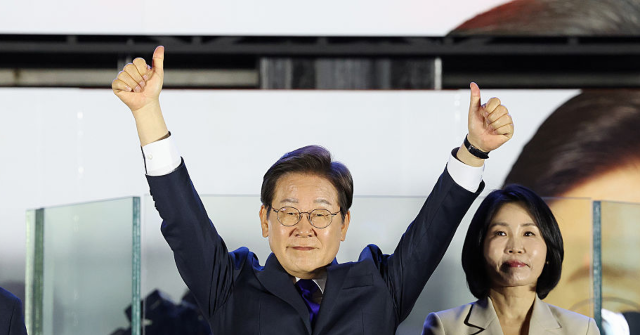Multiple courts on Monday and Tuesday indefinitely suspended criminal cases against leftist President Lee Jae-myung in South Korea, citing presidential immunity.
The case paused on Tuesday by the Seoul Central District Court involved allegations of corruption regarding zoning for developments; in Monday’s case, at the appellate level, Lee faced charges of falsifying facts during the 2022 presidential election, a potential violation of election laws.
Lee faced five cases, all involving various forms of corruption, while running for the presidency in a special election at the beginning of this month. He won the election anyway, soundly defeating his rival Kim Moon-soo of the conservative People Power Party (PPP) while his own Democratic Party retains control of the National Assembly.
The June 3 special election occurred six months after Lee’s predecessor Yoon Suk-yeol, who won the 2022 presidential race against Lee, abruptly declared that he would attempt to impose martial law on the country in response to Democrat obstructionism of his legislative agenda at the National Assembly. Yoon’s martial law, declared on December 3, lasted about six hours before lawmakers organized in the early morning hours to vote against it, fighting off flanks of well-armed soldiers blocking the Assembly. Lawmakers impeached Yoon almost immediately after the failed martial law attempt, resulting in the special election.
The chaos that ensued after Yoon’s impeachment resulted in South Korea being governed by five different presidents in the past six months, as the Democrats also impeached interim President Han Duck-soo.
According to South Korea’s Korea JoongAng Daily, judges on both the appellate and Seoul courts involved in Lee’s cases cited Article 84 of the Korean constitution to suspend Lee’s cases. The article in question reads, “The president shall not be charged with a criminal offense during his tenure of office except for insurrection or treason.”
Yoon, following his attempt to impose martial law, was charged with treason.
The right-leaning Korean newspaper Chosun Ilbo noted that legal scholars in the country do not agree on a uniform interpretation of Article 84. While some experts state that the article effectively bans all criminal trial proceedings against a president, others have suggested that the provision only limits the beginning of new criminal trials and does not affect court cases “grandfathered” into existence before the person in question assumes the office of the presidency. Two different courts citing the article to suspend Lee’s cases will help create precedent for the use of that article in the future, however, in favor of interpreting it as applicable to cases in vigor prior to a president’s inauguration.
Two of Lee’s criminal trials have yet to be suspended at press time. JoongAng listed the five cases as:
The appeals trial over election law violations; the appeals trial over charges of inciting perjury; the first trial for the Daejang-dong, Wirye, Baekhyeon-dong and Seongnam FC scandals; the first trial concerning the alleged remittance to North Korea and the first trial concerning the alleged misuse of a Gyeonggi government corporate card.
The latter two have not been suspended at press time.
The election law case, prior to Lee’s election, was considered the most likely to potentially derail a presidency in the event that he won the election. The case was suspended Monday, but had reached the Supreme Court prior to the election this year. Supreme Court justices voted to remand the case back down to the appellate level in May; if he were to be found guilty by the appellate court, he would be disqualified from holding public office. The appellate court indefinitely suspended the case on Monday.
The suspensions follow concerns on the South Korean right following Lee’s inauguration last week, done in haste to restore stability to the turbulent executive office. Hours after Lee became president, the Democrats in the National Assembly moved forward a bill to expand the nation’s Supreme Court from 14 justices to 30, claiming that the volume of work the justices handle is too large for only 14 of them, leading to unjustifiable delays in due process. Reports indicated that the Democrats initially sought to expand the number of seats to 100, but considered that proposal too unpopular to realistically pass. If passed, the law to pack the court would grant Lee the ability to nominate justices and the Democratic-led Assembly the chance to approve them.
Lee’s government has also moved in the last week to expand criminal proceedings against Yoon, even as Lee’s own cases are suspended. On Tuesday, Lee’s Cabinet approved several bills to appoint special counsels on corruption cases involving Yoon and his wife Kim Keon-hee.
“Lee’s enactment of the three special counsel bills, the first since taking office, was intended to meet the public’s expectations for addressing insurrection charges and restoring constitutional order, as reflected in the presidential election,” presidential spokesperson Kang Yu-jung reportedly explained.
South Korea’s presidents have a history of facing criminal accusations and resigning or being expelled from office for inappropriate actions. Among the modern cases of presidents falling in disgrace are conservative former President Park Geun-hye, arrested for allegedly letting senior members of a cult edit her foreign policy speeches, and former President Lee Myung-bak, found guilty of taking bribes and other corruption.
Follow Frances Martel on Facebook and Twitter.
Read the full article here
